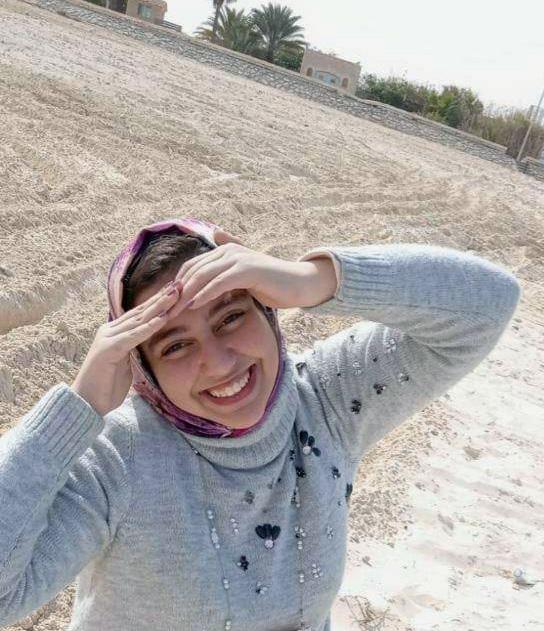
3 minute read
Habiba Omran
from MIK // KOR kari újság // 2023
by Faculty of Engineering and Information Technology, University of Pécs
Habiba Omran is an Egyptian third-year student holding the Stipendium Hungaricum scholarship. She majoring in electrical engineering.
Do you have any advice for future engineers?
Choose your specialization carefully because being an engineer isn’t a journey that will end with graduation. It is a field that is advancing at an unprecedented rate, so you should have the passion and self-discipline to keep your knowledge and skills up to date.
What do you like about our faculty?
Visiting the international registry office to collect the necessary documents was the first thing I did when I arrived at the faculty. The welcoming and patient attitude of the workers left a positive impression on me about the faculty staff. As time passed, I was never disappointed. From the workers to the professors, everyone is nice and available to help students whenever needed. Additionally, I appreciate that the building itself is modern and equipped with laboratories that offer hands-on experience. Moreover, the scholarship opportunities and programs available at the faculty encourage collaboration among students, fostering a sense of community that helps students learn from each other, making our faculty unique.
Can you tell me something in Hungarian? Do you practice Hungarian?
Habiba vagyok. unfortunately, I only know the basic words and numbers that I need to get through my daily life activities.
Around 1000 students commenced their studies at the Faculty of Engineering and Information Technology of the University of Pécs (Hungarian abbreviation PTE MIK) in the first year of the 2022/2023 academic year. A quarter of the new students were international students. In previous years, 280-290 points were needed to gain admission to the faculty. However, in the 2022/2023 academic year, the admission threshold for several majors was raised to 340-350, and the threshold for the one-tier architecture training program was set at 370. This was highlighted as a fundamental qualitative shift in engineering higher education in Hungary, in one of our articles.
“I try to encourage openness and flexibility in my students,” says Dr Géza Cs. Nagy, who retired from the Department of Mechanical Engineering last year after 20 years of lecturing, even though he is still teaching today. According to him, mechanical engineers are the Jolly Jokers of engineering and technical fields: the knowledge acquired at university and the understanding of the relevant logic systems prepare students who are sensitive to their surroundings and care about the environment for a wide range of jobs and professions.
The Budapest Boda Gallery recently organized a successful auction of paintings by Dr Attila Béla Széll, Associate Professor at the Faculty. The architect, who creates paintings of poems by Endre Ady or Attila József, says that although the form of beauty is of primary concern, structure is also essential so that the building created in the mind, is stable in reality. In addition to professional knowledge, he also aims to convey a world view to his students, and often teaches his classes in a real built environment to illustrate his ideas.
In MIK-KOR, we introduce the faculty’s Structural Diagnostics and Analyses Research Team. The team’s research primarily focuses on the development and promotion of practical applications for processes and materials that contribute to the safety and economic sustainability of our built environment. The team’s main activities are in the fields of certification, expertise, research and development and education within the construction industry. Additionally, the team conducts research in areas such as the environment, building energy and other advanced materials sciences.
Dual students perform better - this was the conclusion of the Dual Partner Forum organized by the Faculty in January 2023 between its industrial partners, the Pécs-Baranya Chamber of Commerce and Industry and the South Transdanubian Mechanical Engineering Cluster. The faculty launched its dual training program in 2015, mainly targeted at students enrolled in the six bachelor programs. The proportion of students attending this type of training is around 20-25% of the total student population, with the highest participation rate for electrical engineers at about 40%.
The magazine also examines the work of the student union, highlighting the fact that students have once again recognized the conscientious efforts of their teachers. Ten teachers were rewarded for their outstanding student-friendly attitude and dedication. In addition to its well-established cultural, professional and social events, the Student Union places great emphasis on improving the quality and quantity of sports opportunities available at our faculty. The faculty’s gym hosts weekly training sessions for students and organizes tournaments and championships in various disciplines, led by qualified coaches.
Read an interview with Dr Tibor Zoltán Dányi, Assistant Professor at the Department of Building Structures and Energy Design, who spent six semesters as a visiting lecturer at the Metropolitan State University of Denver. During his time in Denver he focused on teaching the concepts of solidarity architecture.
“Some people fear language difficulties when teaching abroad, but not all students are native English speakers. I had Japanese students, Indian, Iraqi, Iranian, and Mexican - I loved the diversity. Our common language was architecture, and we could always express ourselves. You need to explore the world; it’s great to see how people have different ways of living in other countries and to experience that there is more to life than the way we live. Being abroad is also an adventure about embracing difference and the greatness of diversity” – says Dr Tibor Dányi.










